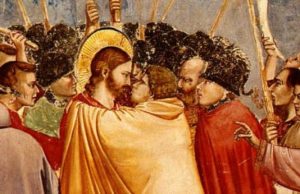The name Judas is one that has become synonymous with betrayal. Judas is likely the best-known traitor in human history because of his actions with Jesus of Nazareth. The gospels provide an account of Judas that is both compelling and frightening.
What is known about Judas
Judas was selected by Jesus to be one of the Twelve Apostles. The Apostles were leaders among the larger group of disciples that followed Jesus and were those who had followed Jesus the longest. Judas was part of the inner circle of Christ’s followers.
The name Iscariot
The title Iscariot is attached to Judas but there seems to be no clear understanding of the meaning of Iscariot. The most likely is that Iscariot is Hebrew for “man of the dagger.” The Hebrew word Ish, meaning man and Sicarii which meant dagger.
 The reference is most probable to the political views of Judas. (New International Encyclopedia of Bible Characters p. 387)
The reference is most probable to the political views of Judas. (New International Encyclopedia of Bible Characters p. 387)
The Sicarii were a radical splinter group of the Jewish sect of the zealots and Judas was likely a member. The zealots desired a restoration of the nation of Israel from Roman occupation and began stirring civil unrest during the ministry of Jesus. The result of the zealot riots was a revolt against the Roman Government in 70 A.D. The revolt ended with the destruction of Jerusalem and the slaughter of the zealots.
Position
Judas was the treasurer of the disciples. He was given the task of handling the finances and once objected to the use of expensive perfume on Jesus before his death. His objection was that the perfume should be sold and the money given to the poor. However, the gospel of John records that Judas was already stealing from the money bag and his motive was to get more money for himself.
Why Judas betrayed Jesus?
There is a great deal of speculation on the reasons that Judas had for betraying Jesus. Honestly, no one likely knew the exact reason except Judas himself. There are several theories but the two most likely involve politics and greed.
Political reasons
Judas may have been trying to incite a rebellion against the Roman Government. Judas understood that Jesus had incredible influence in Israel and had thousands of followers. Just a few days prior, Jesus was hailed as the coming King of Israel during His entry into Jerusalem. If Jesus were unjustly arrested by the Roman Government, it might have enough impact to sway large numbers of people to revolt. If this was the plan, it failed miserably. Not only did the crowds not rise up against the Romans, but they also called for the execution of Jesus.
Greed
John’s gospel records that Judas was taking money from the disciple’s treasury. John records that Judas attempted to get additional money into the treasury with the motive to steal it. When Judas betrays Jesus, he gains a small amount of money, thirty silver coins. According to A.T. Robertson, thirty silver coins would have been the price of a slave. (Robertson’s Word Pictures – Matthew 26:15 entry) The price was relatively low compared to the treason Judas committed.
Whatever the reason for the betrayal of Judas, the result was the crucifixion of Jesus. Judas was moved with incredible remorse following the trial and the resulting execution of Jesus that he returned the money to the members of the Jewish ruling council. After Judas returned the coins, he went out a hung himself.
The story of Judas is one of the saddest in the New Testament because he had the opportunity to make history as a follower of Jesus but instead makes history for his betrayal. Judas had the potential to do great things for Christ and the church. He chose to do the despicable and cause the death of Jesus.






